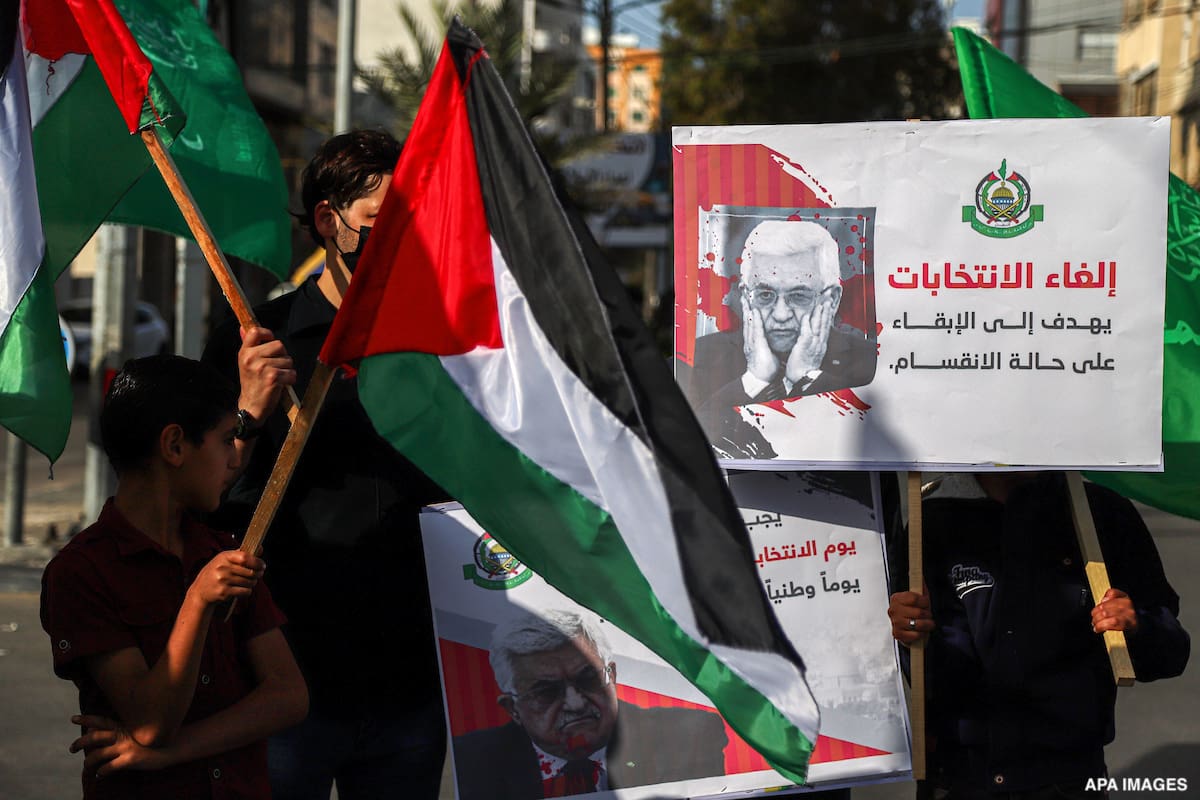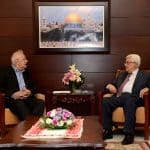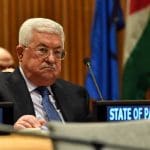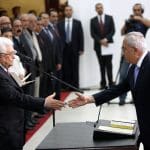
Palestinian Authority (PA) President Mahmoud Abbas is one of the world’s oldest leaders, and as his presidency exceeds its democratic mandate by 14 years this year, Al-Shabaka policy analysts reflect on his legacy. In addition to orchestrating the 1993 Oslo Accords, which reduced the Palestinian liberation movement to a national project within the occupied West Bank and Gaza, Abbas has restricted the Palestinian economy to dependence on donor aid and established a security sector committed to coordination with the Israeli regime. Many Palestinians will therefore undoubtedly remember Mahmoud Abbas as the leader who entrenched their reality under Israeli occupation. 1
In this roundtable, Tareq Baconi, Yara Hawari, Alaa Tartir, and Tariq Kenney-Shawa offer incisive critiques of Palestinian leadership. Collectively, they make clear that Abbas has presided over the continuation of the status quo of Israeli occupation and apartheid, the criminalization of Palestinian resistance, the suppression of the democratic process, and the abandonment of a comprehensive vision for a decolonized Palestinian future.
Leadership Without a Vision for Liberation
Tareq Baconi
In early June 2022, Mahmoud Abbas made a rare appearance in the streets of Ramallah and mingled with passersby to dispel rumors of a stroke. If it had been a more frequent occurrence, driven not by the need to prove longevity but by a desire to connect with his people, Abbas might have encountered the resentment and despair that Palestinians feel towards his authoritarian and defunct leadership, now well over a decade past its democratic mandate.
A key behind-the-scenes figure in the Oslo Accords, Abbas’s legacy is as the bureaucrat who sustained the architecture of the autonomy ushered in by those negotiations — a form of limited governance that perpetually falls short of self-determination or statehood. Lacking a vision for liberation or effective strategic capabilities, Abbas has excelled at facilitating the Israeli regime’s efforts to manage the status quo by remaining committed to an extensive infrastructure of security coordination — preventing all forms of Palestinian resistance to Israel’s continued domination — and entrenching Israel’s divide and rule policies between conflicting Palestinian factions in the West Bank and Gaza.
The ineptitude of Abbas’s leadership lies not only in undermining the Palestinian quest for liberation, but in doing so while expanding and fortifying authoritarian rule Share on X
For Western counterparts, Abbas is often described as a man of peace, a figure who chooses stability over resistance, and an active player in a peacemaking industry widely understood to be aimed at sustaining Palestinian subjugation rather than delivering statehood. To many Palestinians, his formulation of peace translates into acquiescence to Israeli settler-colonial apartheid. Abbas has institutionalized this vision in the very vehicles of Palestinian liberation he chairs. Indeed, under his tenure, the Palestine Liberation Organization (PLO) has been effectively hollowed out and turned into an impotent organization. This has not only weakened the capacity of the sole representative of the Palestinian people to formulate an effective strategy for liberation, it has also further fragmented the Palestinian people.
By subsuming the PLO into the offices of the PA, Abbas has effectively cut out the Palestinian diaspora, which forms the majority of the Palestinian people, and reduced this expansive and powerful representation of Palestinian peoplehood to an ineffective and divided bureaucracy in the West Bank and Gaza committed to self-governance under occupation. The ineptitude of Abbas’s leadership lies not only in undermining the Palestinian quest for liberation, but in doing so while expanding and fortifying authoritarian rule and undermining all forms of Palestinian democratic norms.
His replacement, currently expected to be Hussein al-Sheikh, Secretary-General of the PLO’s Executive Committee, is likely to deepen Palestinian subservience to the Israeli regime through expanding the system of security coordination that remains dear to Abbas, and that sits at the heart of the Oslo Accords. Al-Sheikh will likely attempt to couch these policies in a discourse of defiance, resistance, and Palestinian rights, much like his predecessor. If he starts venturing out onto the streets beyond his halls of power, he will quickly learn how hollow his words ring. In this way, al-Sheikh’s rise to succession encapsulates Abbas’s legacy: the creation of a bureaucracy of Palestinian governance that lacks any vision for Palestinian liberation and that allows Israel’s system of apartheid to continue at very little cost.
Cementing Authoritarianism and Destroying Democracy
Yara Hawari
Throughout his reign, Abbas has made numerous disingenuous calls for elections, the last of which was in January 2021, when he issued a presidential decree calling for legislative elections to be held the following May. While the PA took steps that indicated elections may indeed take place — going so far as to set up electronic voter registration — Abbas ultimately canceled them in April 2021, citing the Israeli regime’s refusal to allow Palestinians in East Jerusalem to participate. This was the closest the PA had come to holding elections since 2006, and the gesture temporarily satiated the international community’s appetite for moves toward democratizing the PA — a body it has propped up for three decades.
Nonetheless, for Palestinians, the international community’s demand for democratization remains dubious given its rejection of the 2006 democratic Palestinian election results and indifference to the Israeli regime’s subsequent siege on Gaza. Moreover, the West’s persistent reduction of a democratic society to the mere existence of democratic elections demonstrates its disingenuity. While elections may well be a product of a meaningful democratic process and culture, they can also take place in a society where other key elements of a democracy are lacking or entirely absent, and serve instead to reinforce the status quo. Such is the case in the West Bank and Gaza, where any elections would inevitably result in either a continuation of the existing power structures or simply reproduce another authoritarian leadership.
Indeed, a more comprehensive understanding of democracy recognizes that elections have to be part of a package in which democracy exists across society and where political plurality is accepted and encouraged. This is far from the reality inside Palestinian political institutions in the West Bank, where Abbas has cemented a system that revolves around his leadership with little room for accountability or transparency. Senior positions are assigned based on patrimonialism and nepotism, forming an all-male echo chamber that reiterates the president’s positions.
Moreover, Abbas has merged all three branches of government — the legislative, executive, and judiciary — so that there is no separation of, or checks to, power within Palestinian political institutions. His latest move in this regard was to create a High Judicial Council and appoint himself as head. Meanwhile, critical voices are pushed to the margins, with journalists and activists routinely arrested and threatened for criticizing Abbas on media and social media platforms.
In Ramallah, the de facto capital of the PA, pictures of Abbas loom over employees in government buildings and over pupils in schools; they even adorn walls of private businesses. This is not to be mistaken for popularity, however, as a September 2022 poll found that at least 74% of Palestinians do not want Abbas to remain president. Furthermore, his inner circle is continuously compelled to stage press conferences or public appearances as a form of proof of life to quell rumors of his death. In this regard, he is well on his way to fitting the mold of a quintessential despotic Arab leader.
But Abbas cannot be given all the credit; this kind of authoritarian rule is directly a product of the Israeli regime, which, in addition to propping up the PA, has also actively and consistently imposed repressive measures against Palestinian politics and democratic expressions. Indeed, an authoritarian and compliant Palestinian leadership serves the Israeli regime’s goals well. Yet authoritarianism is neither inherent to the Palestinian people nor is it an inevitable outcome of settler-colonial domination. Abbas may leave the Palestinian people with a legacy of entrenched authoritarianism, but they, too, have their own legacy: resistance and defiance against all odds.
Criminalizing Resistance and Entrenching Securitization
Alaa Tartir
Under Abbas, the PA has managed to further deepen its security coordination with the Israeli regime, entrenching an institutional policy of governing with an iron fist. Indeed, in the last decade, the PA security establishment has consolidated power more than ever and received the largest portion of the PA budget, allowing it to solidify its authoritarian and repressive rule over the Palestinian people. As a result, a participatory, inclusive, and democratic political transition continues to be denied, and Palestinian resistance to Israeli oppression — armed and otherwise — is continuously repressed in order to prioritize security and the perpetuation of the status quo.
Abbas may leave the Palestinian people with a legacy of entrenched authoritarianism, but they, too, have their own legacy: resistance and defiance against all odds Share on X
These practices have become increasingly pervasive under Abbas, and are part and parcel of the architecture of governance in the West Bank and Gaza. As a result, it is more than likely that structural authoritarianism will continue after his reign ends. Indeed, after Abbas, a new Fatah leadership will neither be interested in nor able to deviate from the PA’s deeply entrenched practices over the past decades. Abbas’s possible successor, Hussein al-Sheikh, currently oversees security coordination with the Israeli regime — an arrangement Abbas has described as “sacred” — and shows no signs of altering the PA’s relationship with it. So long as this arrangement is in place, serving the interests of the Israeli regime and ruling Palestinian elite, hope for democratic change remains unattainable.
Other senior members of Fatah and the PA security establishment describe security coordination as an “avenue for independence” and as “part and parcel of the liberation strategy.” Yet within the reality of settler colonialism, coordination can only be understood as domination. It is no wonder, then, that the vast majority of the Palestinian people reject security coordination; they correctly understand it as a further layer of denial of their basic human, civil, and political rights.
The ruling elite seek no less than the continuation of the PA in order to preserve their illegitimate power and influence, entirely disregarding the popular will of Palestinians. After Abbas, authoritarianism will thus continue to be justified under the pretext of ensuring stability and preventing chaos.
This reality is not new to the Palestinians who have lived it with each of Abbas’s successive and undemocratic terms over the past 14 years. In this way, his most lasting legacy will be the continuation of the authoritarian status quo he created — one that deliberately refuses to center the people in the political project through building accountable, legitimate, democratic, and representative institutions.
Centering the Palestinian people and ensuring their right to resist under settler-colonial occupation, as well as empowering them to unify under a national project in spite of forced fragmentation, are the key pillars to breaking away from the status quo. However, thanks to Abbas, any “new” leadership of the PA after his departure will perceive these pillars as threats to their authoritarian rule, and will therefore utilize all available resources and avenues to deny and suppress them. In other words, these pillars are not temporary or circumstantial to Abbas’s rule; rather, his legacy will be their ongoing suppression as part of a strategic and fundamental component of governance, leaving the Palestinians increasingly at odds with their leadership.
A Leader Committed to Dependence
Tariq Kenney-Shawa
As president of the PA, Abbas has presided over the entrenchment of Israeli occupation and apartheid, a deepening of internal corruption, and the effective death of the two-state solution. However, despite his ineptitude, it would be inaccurate to blame Abbas entirely for the dire situation in which Palestinians find themselves. Even that would be giving him too much recognition. Arguably, any leader who is entirely dependent on foreign aid and lacks control of their own borders is doomed to fail.
It is through the lens of dependence that Abbas’s legacy should be understood. In his increasingly paranoid quest to maintain power within the fragmented bantustans allotted to him by the Israeli regime, Abbas has remained loyal to the US-sponsored “peace process.” He has hoped that through negotiations and appeasement, he would gain the trust of Israeli leaders and their US backers; the survival of his party and his political vision continue to depend on it. In doing so, his forces have silenced anyone who has dared to propose alternative visions, suppressed Palestinian civil society, and ultimately served as subcontractors of the Israeli occupation.
Even in his rare attempts to stand up to the Israeli regime and its US benefactors, for example, by promoting Palestinian membership in the UN and threatening to push for investigations into Israeli war crimes at the International Criminal Court, Abbas has repeatedly faltered in the face of Israeli and US pressure. His most recent attempts to show his frustration with US intransigency appear as increasingly desperate throes. Meanwhile, his inarticulate outbursts have made it more difficult for the Palestinian diaspora to translate growing international support for Palestinians into actual policy change.
It is unclear what will happen after Abbas, or what will become of a leadership that has neither a mandate nor a vision for a liberated future. And with no official process for elections, the wheels have been set in motion to secure his replacement. The current candidate most likely to succeed him, Hussein al-Sheikh, would represent a continuation of Abbas’s dismal legacy, but many also fear further political repression by Israeli occupation forces.
Regardless of who succeeds Abbas, the US will likely relish the opportunity to symbolically bolster relations with the PA in what will be billed as an effort to revive the two-state solution and maintain the status quo, predicated on prioritizing Israel’s interests over Palestinian rights. Indeed, the US will reiterate support for a PA that is capable of maintaining internal stability, while not strong enough to challenge the Israeli regime. The US may even increase financial support to the PA as a gesture of goodwill and an incentive for further cooperation. In light of the Israeli regime’s new far-right, extremist government, the US approach will continue to be one of “conflict management” and maintaining security while Israel tightens its grip on the Palestinians.
In truth, it matters little who emerges at the helm of the PA. The very nature of its relationship with the Israeli regime and the US is what ensures its undoing. As long as Palestinian leadership remains committed to dependence and subservient to the Israeli regime and donor community, it will never seek liberation and the Palestinian people will continue to take resistance into their own hands.
- To read this piece in French or Spanish, please click here or here, respectively. Al-Shabaka is grateful for the efforts by human rights advocates to translate its pieces, but is not responsible for any change in meaning.
Yara Hawari is Al-Shabaka’s co-director. She previously served as the Palestine policy fellow and senior analyst. Yara completed her PhD in Middle East Politics at the University of Exeter, where she taught various undergraduate courses and continues to be an honorary research fellow. In addition to her academic work, which focused on indigenous studies and oral history, she is a frequent political commentator writing for various media outlets including The Guardian, Foreign Policy, and Al Jazeera English.
Tariq Kenney-Shawa is Al-Shabaka’s US Policy Fellow and co-host of Al-Shabaka’s Policy Lab series. He holds a Masters degree in International Affairs from Columbia University. Tariq’s research and writing have covered a range of topics, from the role of open-source intelligence in exposing Israel’s war crimes to analysis of Palestinian liberation tactics. His writing has appeared in The Los Angeles Times, Foreign Policy, and The Nation, among others. Follow Tariq on Twitter @tksshawa and visit his website at https://www.tkshawa.com/ for more of his writing and photography.
Tareq Baconi serves as the president of the board of Al-Shabaka. He was Al-Shabaka’s US Policy Fellow from 2016 – 2017. Tareq is the former senior analyst for Israel/Palestine and Economics of Conflict at the International Crisis Group, based in Ramallah, and the author of Hamas Contained: The Rise and Pacification of Palestinian Resistance (Stanford University Press, 2018). Tareq’s writing has appeared in the London Review of Books, the New York Review of Books, the Washington Post, among others, and he is a frequent commentator in regional and international media. He is the book review editor for the Journal of Palestine Studies.
Alaa Tartir is Al-Shabaka’s program and policy advisor. He is a senior researcher and director of the Middle East and North Africa Programme at Stockholm International Peace Research Institute, as well as a research associate and academic coordinator at the Geneva Graduate Institute, global fellow at the Peace Research Institute Oslo, and governing board member of the Arab Reform Initiative. Alaa holds a PhD from the London School of Economics and Political Science and is co-editor of Resisting Domination in Palestine: Mechanisms and Techniques of Control, Coloniality and Settler Colonialism (2023), Political Economy of Palestine: Critical, Interdisciplinary, and Decolonial Perspectives (2021) and Palestine and Rule of Power: Local Dissent vs. International Governance (2019). He can be followed on Twitter (@alaatartir), and his publications can be accessed at www.alaatartir.com.


















